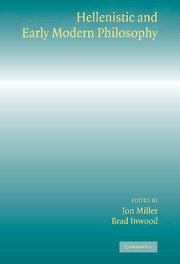Book contents
- Frontmatter
- Contents
- List of Abbreviations
- Notes on Contributors
- Preface
- Introduction
- 1 Stoicism in the Philosophical Tradition
- 2 Early Modern Uses of Hellenistic Philosophy
- 3 Locke's Offices
- 4 Patience sans Espérance: Leibniz's Critique of Stoicism
- 5 Epicureanism in Early Modern Philosophy
- 6 Stoics, Grotius, and Spinoza on Moral Deliberation
- 7 The Discourse on the Method and the Tradition of Intellectual Autobiography
- 8 Subjectivity, Ancient and Modern
- 9 Spinoza and Philo
- 10 Hume's Scepticism and Ancient Scepticisms
- 11 Stoic Naturalism in Butler
- Bibliography of Primary Sources
- Bibliography of Secondary Sources
- Index (general)
- Index (of selected text passages)
5 - Epicureanism in Early Modern Philosophy
Leibniz and His Contemporaries
Published online by Cambridge University Press: 05 August 2012
- Frontmatter
- Contents
- List of Abbreviations
- Notes on Contributors
- Preface
- Introduction
- 1 Stoicism in the Philosophical Tradition
- 2 Early Modern Uses of Hellenistic Philosophy
- 3 Locke's Offices
- 4 Patience sans Espérance: Leibniz's Critique of Stoicism
- 5 Epicureanism in Early Modern Philosophy
- 6 Stoics, Grotius, and Spinoza on Moral Deliberation
- 7 The Discourse on the Method and the Tradition of Intellectual Autobiography
- 8 Subjectivity, Ancient and Modern
- 9 Spinoza and Philo
- 10 Hume's Scepticism and Ancient Scepticisms
- 11 Stoic Naturalism in Butler
- Bibliography of Primary Sources
- Bibliography of Secondary Sources
- Index (general)
- Index (of selected text passages)
Summary
The Reception of Epicureanism Amongst the Moderns
The Epicurean system of natural philosophy and ethics presented a major attraction for seventeenth century philosophers, for whom it offered a powerful alternative to Christian Aristotelianism and the theory of man's corrupted and sinful nature. On the natural philosophy side, it furnished the underlying system – corpuscularianism – of the moderns, or, in seventeenth century terms, the “innovators.” On the ethical side, the revival of the Epicurean doctrine of pleasure is evident in seventeenth century moral philosophy, in which references to happiness, joy, and pleasure begin to take on a more positive tone, though they are constrained by the doubt that a secular morality is possible and by worries over concupiscence. It would be a worthwhile project to trace the reaction to and reinterpretation of each of the major Epicurean doctrines, including the ideational nature of God and the evolution of the functional animal in early modern philosophy. Meanwhile, the efforts of an idealistic, and somewhat authoritarian philosopher, Leibniz, to come to terms with ambient Epicureanism will serve to illustrate this mixed, but, on the whole, highly positive reception.
Assimilating is always a more dangerous philosophical and intellectual strategy than distinguishing. Qualifications are needed, and the chapter will supply them in due course. But I suspect that the Epicureanism of the moderns has been underestimated for two reasons that do not amount to justifications.
- Type
- Chapter
- Information
- Hellenistic and Early Modern Philosophy , pp. 90 - 115Publisher: Cambridge University PressPrint publication year: 2003

